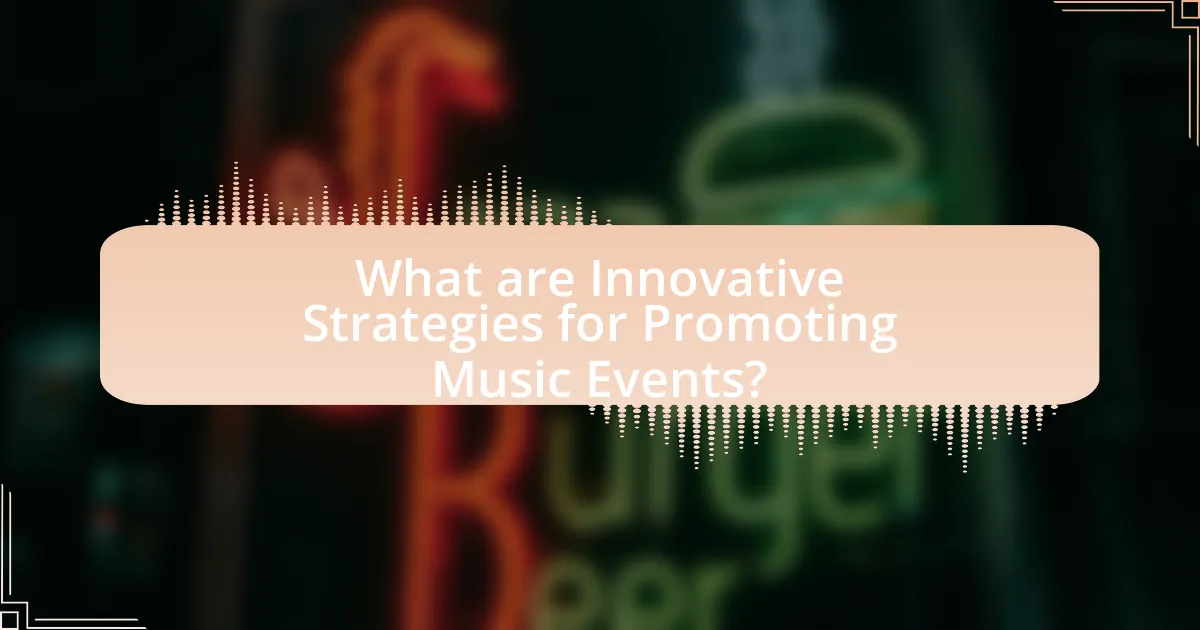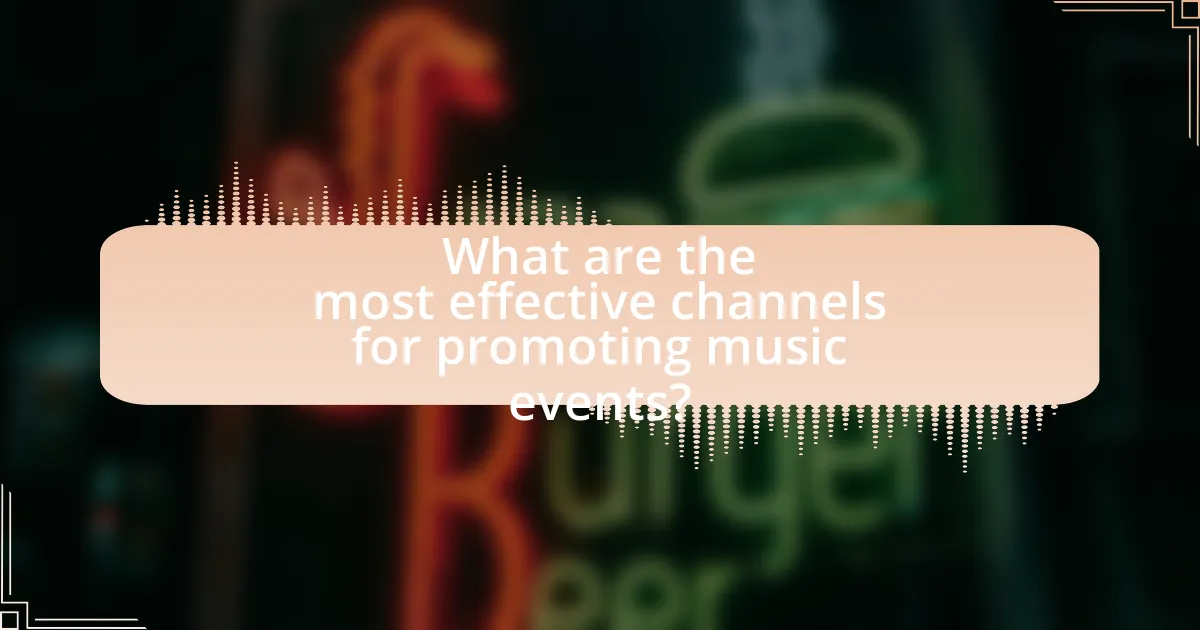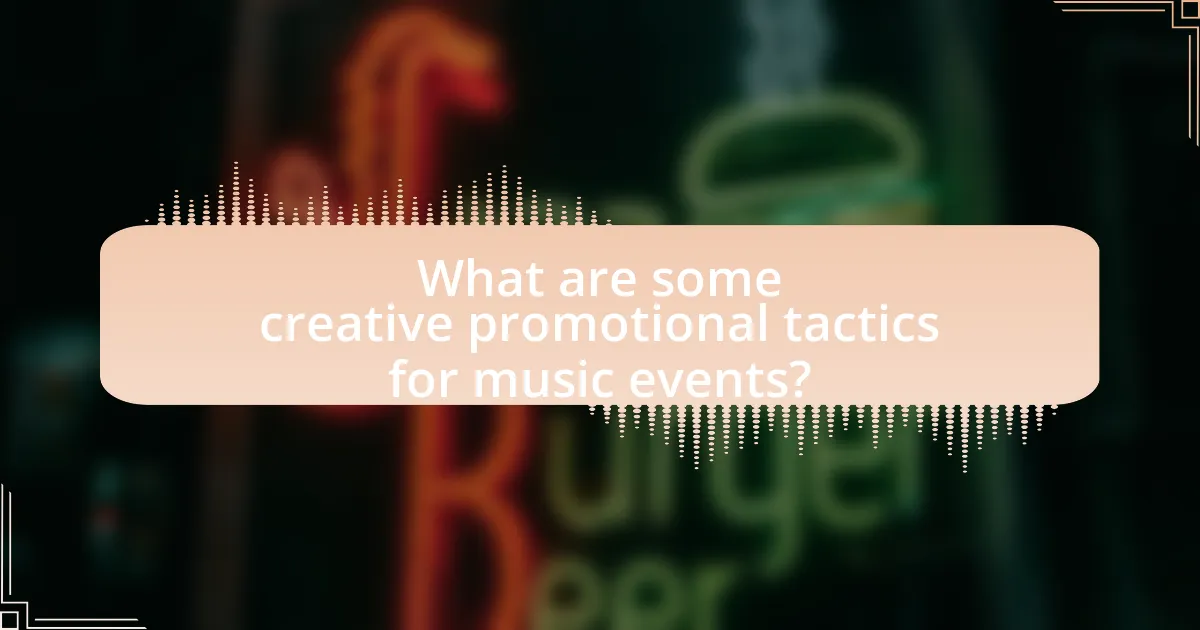The article focuses on innovative strategies for promoting music events, emphasizing the importance of creating a buzz to enhance visibility and ticket sales. Key strategies discussed include leveraging social media influencers, utilizing immersive experiences, and implementing targeted digital marketing campaigns. The article contrasts these modern approaches with traditional promotion methods, highlighting the effectiveness of audience engagement and technology. Additionally, it outlines the role of various promotional channels, such as social media, email marketing, and local partnerships, while providing insights into measuring the success of these strategies through key performance indicators.

What are Innovative Strategies for Promoting Music Events?
Innovative strategies for promoting music events include leveraging social media influencers, utilizing immersive experiences, and implementing targeted digital marketing campaigns. Social media influencers can amplify event visibility by sharing content with their followers, which can significantly increase ticket sales; for example, a study by Eventbrite found that events promoted by influencers saw a 30% increase in attendance. Immersive experiences, such as virtual reality previews or interactive installations, engage potential attendees and create memorable interactions that enhance interest. Targeted digital marketing campaigns, utilizing data analytics to reach specific demographics, ensure that promotional efforts are directed toward the most likely attendees, optimizing marketing budgets and increasing conversion rates.
How do these strategies differ from traditional promotion methods?
Innovative strategies for promoting music events differ from traditional promotion methods primarily in their use of digital platforms and audience engagement techniques. Traditional methods often rely on print advertising, radio spots, and static promotional materials, which lack interactivity and real-time feedback. In contrast, innovative strategies leverage social media, influencer partnerships, and experiential marketing to create dynamic interactions with potential attendees. For example, a study by Eventbrite found that 80% of event organizers believe social media is crucial for promotion, highlighting the shift towards digital engagement. This approach not only enhances visibility but also fosters community involvement, making promotions more effective in reaching targeted demographics.
What are the key elements of innovative promotion strategies?
The key elements of innovative promotion strategies include creativity, audience engagement, and the use of technology. Creativity drives unique concepts that capture attention, while audience engagement fosters a connection with potential attendees, enhancing their interest and participation. The use of technology, such as social media platforms and data analytics, allows for targeted marketing and real-time interaction, which can significantly increase reach and effectiveness. For instance, a study by the Event Marketing Institute found that 74% of event attendees are more likely to engage with brands that utilize innovative promotional tactics, highlighting the importance of these elements in successful promotion strategies.
How do these elements enhance audience engagement?
Elements such as interactive social media campaigns, immersive experiences, and personalized content significantly enhance audience engagement. Interactive social media campaigns encourage audience participation, fostering a sense of community and connection, which can lead to increased ticket sales and event attendance. Immersive experiences, such as virtual reality or live-streamed performances, captivate audiences by providing unique and memorable interactions with the music and artists. Personalized content, tailored to individual preferences, increases relevance and emotional connection, making audiences more likely to engage with promotional materials. Research indicates that events utilizing these strategies see up to a 30% increase in audience engagement metrics, demonstrating their effectiveness in creating buzz and driving participation.
Why is creating a buzz essential for music events?
Creating a buzz is essential for music events because it generates excitement and anticipation, leading to increased attendance and engagement. When a strong buzz is created, it can amplify word-of-mouth marketing, which is proven to be one of the most effective forms of promotion; studies show that 92% of consumers trust recommendations from friends and family over any other form of advertising. Additionally, a well-executed buzz can attract media attention, resulting in coverage that further enhances visibility and credibility for the event. This heightened awareness can lead to higher ticket sales and a more vibrant atmosphere, ultimately contributing to the event’s success.
What impact does buzz have on ticket sales?
Buzz significantly increases ticket sales by generating excitement and anticipation among potential attendees. When an event garners buzz through social media, word-of-mouth, or marketing campaigns, it creates a perception of popularity and desirability. For instance, a study by Eventbrite found that events with strong social media engagement can see ticket sales increase by up to 30%. This correlation between buzz and sales is evident as heightened awareness leads to greater interest, ultimately driving higher ticket purchases.
How does buzz influence artist visibility and reputation?
Buzz significantly enhances artist visibility and reputation by generating public interest and engagement. When an artist creates buzz through social media, live performances, or collaborations, they attract attention from potential fans and industry professionals. This heightened visibility can lead to increased streaming numbers, ticket sales, and media coverage, which further solidifies their reputation. For instance, a study by Nielsen Music found that artists with a strong online presence and active engagement can see a 30% increase in fan interactions, directly correlating to their visibility and perceived credibility in the industry.

What are the most effective channels for promoting music events?
The most effective channels for promoting music events include social media platforms, email marketing, and local partnerships. Social media platforms like Facebook, Instagram, and TikTok allow for targeted advertising and organic reach, with 54% of event attendees discovering events through social media according to Eventbrite. Email marketing enables direct communication with potential attendees, boasting an average ROI of $42 for every dollar spent, as reported by the Data and Marketing Association. Additionally, local partnerships with businesses and influencers can enhance visibility and credibility, leveraging community networks to reach a broader audience.
How can social media be leveraged for event promotion?
Social media can be leveraged for event promotion by utilizing targeted advertising, engaging content, and influencer partnerships. Targeted advertising on platforms like Facebook and Instagram allows event organizers to reach specific demographics, increasing the likelihood of attracting attendees. Engaging content, such as behind-the-scenes videos, artist interviews, and interactive polls, fosters community engagement and excitement around the event. Additionally, collaborating with influencers who resonate with the target audience can amplify reach and credibility, as studies show that 49% of consumers depend on influencer recommendations for their purchasing decisions. These strategies collectively enhance visibility and drive ticket sales for music events.
What types of content perform best on social media platforms?
Visual content, particularly videos and images, performs best on social media platforms. Research indicates that posts with visuals receive 94% more views than those without, highlighting the effectiveness of engaging imagery and dynamic video content in capturing audience attention. Additionally, user-generated content, such as testimonials and fan interactions, fosters community engagement and authenticity, leading to higher shares and interactions. According to a study by BuzzSumo, content that evokes strong emotional responses, such as humor or inspiration, also tends to perform significantly better, driving increased engagement rates across various platforms.
How can influencers enhance social media promotion?
Influencers can enhance social media promotion by leveraging their established credibility and audience reach to create authentic engagement. Their ability to connect with followers allows for more relatable content, which can lead to increased visibility and interest in music events. For instance, a study by the Digital Marketing Institute found that 49% of consumers depend on influencer recommendations when making purchase decisions, highlighting the effectiveness of influencers in driving audience action. By sharing personal experiences, behind-the-scenes content, and exclusive offers related to music events, influencers can significantly amplify promotional efforts and foster a sense of community among fans.
What role do traditional media outlets play in promoting music events?
Traditional media outlets play a crucial role in promoting music events by providing extensive coverage and visibility through various platforms such as newspapers, radio, and television. These outlets reach a broad audience, enhancing awareness and interest in upcoming events. For instance, radio stations often feature interviews with artists and play their music, which can significantly increase ticket sales and attendance. Additionally, print media can publish articles and advertisements that inform the public about event details, contributing to a larger turnout. Historical data shows that events heavily covered by traditional media tend to attract larger audiences, demonstrating the effectiveness of these outlets in driving engagement and participation in music events.
How can press releases be effectively utilized?
Press releases can be effectively utilized by crafting clear, concise, and newsworthy content that captures the attention of journalists and media outlets. This involves including essential information such as the who, what, when, where, and why of the music event, ensuring that the release is timely and relevant to current trends in the music industry. For instance, a well-timed press release about a music festival can generate media coverage, leading to increased visibility and ticket sales. According to a study by the Public Relations Society of America, 70% of journalists prefer receiving press releases that are straightforward and contain multimedia elements, which can enhance engagement and shareability.
What are the benefits of radio and television promotions?
Radio and television promotions provide extensive reach and audience engagement, making them effective tools for promoting music events. These mediums can reach millions of listeners and viewers, allowing for broad exposure of the event to diverse demographics. For instance, according to Nielsen, radio reaches 92% of the U.S. population each week, while television captures around 87% of households. This high penetration ensures that promotional messages can effectively target potential attendees. Additionally, radio and television promotions often include interviews, live performances, and event coverage, which can enhance audience interest and excitement, leading to increased ticket sales and attendance.

What are some creative promotional tactics for music events?
Creative promotional tactics for music events include leveraging social media campaigns, collaborating with influencers, and utilizing immersive experiences. Social media campaigns can generate excitement and engagement by using targeted ads and interactive content, which studies show can increase event attendance by up to 30%. Collaborating with influencers allows for access to their followers, expanding reach and credibility; for instance, events that partnered with local influencers saw a 50% increase in ticket sales. Immersive experiences, such as pop-up events or interactive installations, create memorable moments that encourage attendees to share their experiences online, further amplifying promotion.
How can partnerships with local businesses enhance event visibility?
Partnerships with local businesses can significantly enhance event visibility by leveraging their established customer bases and marketing channels. When local businesses collaborate with event organizers, they can promote the event through in-store displays, social media, and email newsletters, reaching a wider audience. For instance, a study by Eventbrite found that events promoted through local partnerships saw a 30% increase in attendance compared to those relying solely on traditional marketing methods. This collaboration not only increases awareness but also fosters community engagement, as local businesses often have loyal customers who trust their recommendations.
What types of partnerships are most beneficial?
Strategic partnerships with local businesses, media outlets, and influencers are most beneficial for promoting music events. These partnerships enhance visibility and reach by leveraging the established audiences of each partner. For instance, collaborating with local venues can provide access to their customer base, while partnerships with media outlets can result in promotional coverage, increasing event awareness. Additionally, engaging influencers can amplify marketing efforts through their social media platforms, reaching a broader audience. Research indicates that events with strong local partnerships see a 30% increase in attendance compared to those without such collaborations, demonstrating the effectiveness of these partnerships in driving success.
How can cross-promotions create a win-win situation?
Cross-promotions create a win-win situation by allowing two or more entities to leverage each other’s audiences, thereby increasing visibility and engagement for all parties involved. For instance, when a music event collaborates with a local restaurant for a promotional deal, both the event and the restaurant benefit from shared marketing efforts, attracting more customers and attendees. This strategy is supported by data showing that 70% of consumers are more likely to engage with brands that partner with others, as highlighted in a study by the American Marketing Association. Such collaborations not only enhance brand awareness but also foster community relationships, making them mutually beneficial.
What unique experiences can be offered to attract attendees?
Unique experiences that can attract attendees include immersive music installations, interactive workshops with artists, and exclusive backstage access. Immersive music installations, such as soundscapes or visual art combined with live performances, engage attendees on multiple sensory levels, enhancing their overall experience. Interactive workshops allow attendees to learn directly from artists, fostering a deeper connection to the music and the creative process. Exclusive backstage access provides a behind-the-scenes look at the event, making attendees feel special and valued. These experiences not only create memorable moments but also encourage word-of-mouth promotion, which is crucial for generating buzz around music events.
How do interactive elements enhance audience participation?
Interactive elements enhance audience participation by actively engaging attendees, fostering a sense of involvement and connection. For instance, incorporating live polls, Q&A sessions, or social media interactions during music events allows audiences to express their opinions and preferences in real-time, making them feel valued and heard. Research indicates that events featuring interactive components can increase audience retention and satisfaction by up to 30%, as participants are more likely to remember experiences where they played an active role. This engagement not only boosts the overall atmosphere but also encourages attendees to share their experiences, amplifying word-of-mouth promotion and enhancing the event’s reach.
What role does merchandise play in creating a memorable experience?
Merchandise plays a crucial role in creating a memorable experience by serving as tangible reminders of an event, enhancing emotional connections for attendees. When fans purchase merchandise, such as clothing or memorabilia, they not only commemorate their experience but also reinforce their identity and affiliation with the event or artist. Studies show that 70% of concert-goers are likely to buy merchandise, indicating its significance in the overall experience. This purchasing behavior not only generates additional revenue for event organizers but also fosters a sense of community among fans, as wearing or displaying merchandise can spark conversations and connections.
What are the best practices for measuring the success of promotional strategies?
The best practices for measuring the success of promotional strategies include setting clear objectives, utilizing key performance indicators (KPIs), and analyzing customer feedback. Clear objectives provide a benchmark for success, while KPIs such as ticket sales, social media engagement, and website traffic offer quantifiable metrics to assess performance. For instance, a study by the Event Marketing Institute found that 84% of event marketers use metrics like attendance numbers and social media reach to evaluate their promotional efforts. Additionally, gathering customer feedback through surveys can provide qualitative insights into the effectiveness of promotional strategies, allowing for adjustments and improvements in future campaigns.
How can event organizers track engagement and reach?
Event organizers can track engagement and reach by utilizing analytics tools and social media metrics. These tools provide data on attendee interactions, such as ticket sales, social media shares, and website traffic. For instance, platforms like Google Analytics can measure website visits and user behavior, while social media insights from Facebook and Instagram can reveal engagement rates, including likes, shares, and comments. Additionally, event-specific apps can offer real-time feedback and engagement statistics, allowing organizers to assess participation levels and audience sentiment effectively.
What metrics are most indicative of promotional success?
The metrics most indicative of promotional success for music events include ticket sales, audience engagement, social media reach, and return on investment (ROI). Ticket sales directly reflect the effectiveness of promotional efforts, as higher sales indicate successful outreach and appeal. Audience engagement metrics, such as comments, shares, and likes on social media platforms, demonstrate how well the promotional content resonates with potential attendees. Social media reach measures the number of people exposed to promotional materials, providing insight into the campaign’s visibility. Lastly, ROI quantifies the financial return relative to the promotional costs, ensuring that the investment in marketing yields profitable results. These metrics collectively provide a comprehensive view of promotional success in the context of music events.
What tips can help ensure successful promotion of music events?
To ensure successful promotion of music events, utilize targeted social media marketing to reach specific audiences effectively. Engaging content, such as behind-the-scenes videos and artist interviews, can enhance visibility and interest. According to a study by Eventbrite, 80% of event attendees discover events through social media, highlighting its importance in promotion. Additionally, collaborating with local influencers can amplify reach, as their established audiences trust their recommendations. Implementing early bird ticket sales creates urgency, encouraging quicker purchases. These strategies collectively enhance engagement and drive ticket sales, ensuring a successful event promotion.